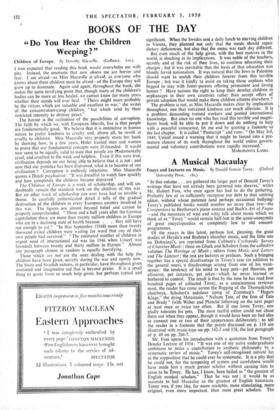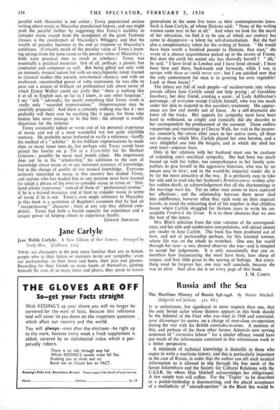A Musical Macaulay
Essays and Lectures on Music. By Donald Francis Tovey. (Oxford University Press. i 8s.) "IN this volume ... are gathered the larger part of Donald Tovey's writings that have not already been garnered into sheaves," writes Mr. Hubert Foss, who once again has had to do the gathering. Probably few of us sufficiently recognise our debt to that untiring editor, without whose patience (and perhaps occasional bullying) Tovey's published books would number no more than two—the Companions to Beethoven's piano sonatas and Bach's Art of Fugue —and the mountain of wise and witty talk about music which we think of as " Tovey " would remain half-lost in the quasi-anonymity of great encyclopaedias or completely lost in old concert- programmes.
Of the essays in this latest, perhaps last, gleaning, the great studies of Haydn's and Brahms's chamber music, and the little one on Dohnanyi's, are reprinted from Cobbett's Cyclopedic Survey of Chamber Music ; those on Gluck and Schubert from the collective volumes The Heritage of Music ; others from Music and Letters and The Listener; the rest are lectures or prefaces. Such a bringing together has a special disadvantage in Tovey's case (in addition to the general ones), a disadvantage arising from one of his weak- nesses: the tendency of his mind to keep pets—pet theories, pet allusions, pet instances, pet jokes—which he never learned or bothered to control. The result is that by the time he has read four hundred pages of collected Tovey, as a conscientious reviewer must, the reader has come across the flogging of the Thomaskirche choirboys, Schubert's sedulous aping of Zumsteeg's " Hagars Klage," the dying Metastasio, "Nahum Tate, of the firm of Tate and Brady" (with Weber and Planche following on the next page) at least once or twice too often. But if one loves Tovey, one gladly tolerates his pets. The most tactful editor could not chase them out when they appear, though it would have been no bad idea to connect one or two of their appearances deliberately ; to tell the reader in a footnote that the points discussed on p. 119 are illustrated with music-type on pp. 142-3 and 158, the last paragraph of p. 49 on pp. 266-7.
Mr. Foss opens his introduction with a quotation from Tovey's Deneke Lecture of 1934: "It was one of my naive undergraduate ambitions to make a contribution to aesthetic philosophy by a systematic review of music." Tovey's self-recognised naiveté lay in the supposition that he could ever be systematic. It is -a pity that he could not, for the tempering of system and carefulness would have made him a much greater scholar without causing him to cease to be Tovey. He has, I know, been hailed as "the greatest of English musical scholars." That he was not ; it would be as accurate to hail Macaulay as the greatest of English historians. Tovey was, if you like, far more readable, more stimulating, more - original, even more important, than most great scholars. The parallel with Macaulay is not unfair ; Tovey popularised serious writing about music as Macaulay popularised history, and one might push the parallel farther by suggesting that Tovey's inability to consider music except from the standpoint of the great Teutonic classics is the counterpart of Macaulay's Whiggery and that his wealth of paradox becomes in the end as tiresome as Macaulay's antitheses. (Certainly much of the peculiar value of Tovey's learn- ing springs from the same cause as the peculiar value of Macaulay's ; both were practical men as much as scholars.) Tovey was essentially a practical musician: first of all, perhaps, a pianist, but conductor and composer as well. But being gifted not only with an intensely musical nature but with an encyclopaedic mind, trained in classical studies (the ancient, non-musical classics), and with an exuberant, uncontrolled power of witty expression, he was able to pour out a stream of brilliant yet professional talk about music of which Ernest Walker could say justly that "there is nothing like it at all in English nor, so far as I know, in any other language." I say " talk " advisedly, for nearly everything that Tovey wrote is really only "recorded improvisation." (Improvisation may be carefully prepared.) And there is certainly nothing else like it ; nor probably will there ever be anything like it again, for those who imitate him never manage to be like him ; the attempt is usually disastrous for the imitator.
Tovey constantly talked or wrote out of his personal experience of music and out of a most wonderful but not quite infallible memory. He probably never bothered to verify a reference—hardly the method of a "scholar." In his brilliant improvisations he made slips, as many lesser men do, but perhaps only Tovey would have passed the howler on p. 216 in a Festschrift for Sir Herbert Grierson ; possibly he never read proofs either. His importance does not lie in his "scholarship," his additions to the sum of knowledge about music or to any increased accuracy of knowledge, but in the change of quality of our musical knowledge. Everyone seriously interested in music in this country has studied Tovey, and anyone who has studied him to any purpose must have learned (to adapt a phrase of his own) to consider music in terms of "first- hand artistic experience" instead of those of " professional routine," if he is a trained musician, and at least to consider music in terms of music if he is not. Tovey's own single reference to Macaulay in this book is a quotation of Bagehot's comment that he had an " inexperiencing " character ; there at any rate they differed com- pletely. Tovey had both a boyish capacity for experience and a unique power of helping others to experience freshly. GERALD ABRAHAM.



































 Previous page
Previous page